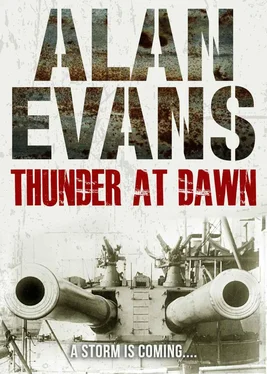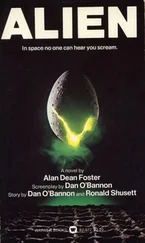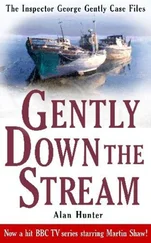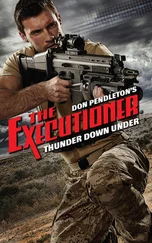He reached out to grab another seaman as he raced past. “Get on top of this wireless office and rip all the aerials adrift!”
“Aye, aye, sir!”
Smith ran on and met Sergeant Burton. “All secure forrard, sir. And we’ve got all the officers, I think.”
“Keep searching. One of the officers nearly got me . Mr. Somers is sitting on him. What happened to yours?”
“Made fast, sir. And a mouthful o’ rope for him to chew on.”
“Add Somers’s man to your collection.”
Then the pinnace thumped alongside and moments later Wakely led his party aboard, swarming across the deck. The ship was theirs. Kennedy came over the side with his two assistants carrying the wares of his trade and they disappeared below.
Smith was not happy. That damned shot! He could not see or hear any sign of an alarm being raised, except — was there activity on Kansas ? He could not be sure.
He made a rapid tour of the upper deck and returned to find the captive crew lined up below the bridge, officers and men, most of them still dazed from sleep, peering owlishly, shivering in the night air. Burton brought the bearded officer to join the others. He held his midriff, badly winded, and wheezed out: “I protest —”
Smith cut him short, savagely, “shut up or I’ll shoot you!”
Wakely, coming up then, flinched at Smith’s words then said, “There isn’t a safe in the Captain’s cabin, sir. Just a desk with three locked drawers.” It had been Wakely’s job to take the safe. “I broke them open and emptied them into a sack.”
“Very good.”
Rudkin, the picket-boat’s engineer, panted up from Gerda’s engine room. “She had steam up, sir. Could ha’ sailed in half-an-hour if she’d wanted.”
“Thank you. Carry on.”
Rudkin swung over the rail and down to the pinnace.
Smith turned to the silent master. “This ship sinks in ten minutes but you will be clear of her by then. Lower your boats.”
“This is a neutral vessel —”
“Or swim.” Smith offered the choice.
The master swallowed and bellowed an order at his crew. In German. They ran to lower the boats.
Smith glanced at his watch. They were on time, in spite of the enforced change of plan caused by the guard-boat. Just. He saw a rent in the left-hand side of his boiler-suit and used his torch to inspect it. The hole was surrounded by a powder-burn. As he switched off the torch he faced Somers. “Where did you spring from?”
The soot on Somers’s face was now striped by sweat-drawn channels. “Checking on the look-outs, sir.”
Posting the look-outs had been one of his duties. Smith said, “I mean before. When you came up from the deck like the demon king.”
“We’d run their boat right in under the stern. Some chap in the stern shouted but he couldn’t see us and went away. I shinned up a line that was hanging and came forrard and there I was.”
“Yes. And here I nearly wasn’t.”
“Sir. Kansas seems to be manning a boat.”
Smith stared across at Kansas . There was activity on her deck, tiny figures moving under the lights. But the rest of the pool was quiet, undisturbed.
Kennedy reappeared, breathing heavily, like all of them his soot-mask was lined and smeared now. “Five minutes, sir.”
“Right.” Smith turned on Somers. “Those two prisoners in the boat — return them to their friends.”
“I’ve done that, sir.”
“Then call in the look-outs.” Smith raised his voice: “Over the side, all of you. Five minutes.”
The ship’s crew were already in their boats and pulling away. The seamen and marines padded across the deck and went down. Burton swung one leg over the rail. Smith cast one final glance around the deserted deck, at the falls hanging loose from the davits so the ship looked untidy, abandoned. As she was. He hated to do this to any ship.
It was time to go.
He called to Beckett where he guarded the wireless office: “Give him the word, then it’s up to him!”
Beckett hammered on the door of the wireless office. “Abandon ship! Ship kaput!”
There was no answer, no reaction. Beckett hesitated and Smith shouted, “Come on! We can’t hang about all night!”
Beckett left his post and started towards him. He had taken only three strides when the door swung open behind him and a man loomed in the doorway pointing a blue gleaming, threatening finger that suddenly flamed and the shot cracked out.
Beckett cried out and fell forward, his face, slack-jowled in shock, turned up to Smith. The man put one foot outside the door, holding it open with his left hand, aiming the pistol with the other. Smith ran at him in black rage at the sudden attack, at himself for not, somehow, preventing it. He ran in, tugging his pistol from his belt. The man fired again, so close the flame seared the eyes but his aim was wild, panicked by Smith’s mad rush, and Smith was already throwing himself to the deck. He fell close enough almost to touch the man whose pistol waved above his head. Smith squeezed the trigger again and again and the hammer clicked on the empty chamber then fired three times. The other pistol that waved above him fired only once, the slug howling off the deck then the pistol fell, clattering. The man reeled back into the cabin. Smith crawled to the door and saw him sprawled, used his torch and saw the arms thrown wide, the eyes staring.
He turned and saw Burton bending over Beckett who was feeling gingerly with his right hand at his left side. Smith used his torch again and saw little blood. The minutes were ticking away. “We’ll look at it in the boat.”
Beckett went down on Burton’s back with his wrists lashed together around Burton’s neck so he could not fall if he fainted, but he clung on grimly. When the hands reached up eagerly from the pinnace to take him he grinned down at them, shakily.
Manton reported, “All present, sir.”
And Somers from the whaler: “All here, sir.”
Kennedy growled, “Less’n two minutes.”
“Full speed ahead,” Smith ordered.
The pinnace eased away from the side of the collier, towing the whaler again but Somers had the oars out and was working furiously. Smith saw outlined against the lights of the shore that Gerda’s boats were well clear then the pinnace swung around the bow of the ship and thrust out into the pool, heading for the deep-water channel. Wakely’s voice came from the bow as the pool opened out before them: “Boat fine on the port bow!”
Smith saw the lights and then made out the boat, a steam pinnace bigger than Thunder’s , and that it was altering course to intercept them. It was moving at speed, throwing up a big, white bow-wave. The intervening distance shrank rapidly until the hail came: “What boat is that?”
Kansas’s pinnace. Smith answered: “ Thunder!”
The American pinnace swung neatly on her heel to come around and foam alongside a dozen feet away. A boyish figure stood at her wheel, white face turned towards Smith, as were all the other faces in her. “ What boat is that?” As if he doubted the evidence of his eyes.
Smith repeated cheerfully, “ Thunder /”
For long seconds the two pinnaces ran side by side as the Americans peered fascinated at the bizarre parties in the opposite pinnace and whaler. Then the explosions came, muffled, dull thumps, seeming more physical vibrations than sounds. Smith saw the collier heave and then settle. Kennedy had blown the bottom out of her. Smoke and steam suddenly roared from her funnel and she began to list. Smith said, “Very effective, Mr. Kennedy.”
Kennedy did not answer and sat stone-faced.
A voice on Kansa s’ s pinnace cried, “ Jee - sus! ” And another: “What the hell ?” She spun away and headed for Gerda . She was the last vessel they saw.
Читать дальше












